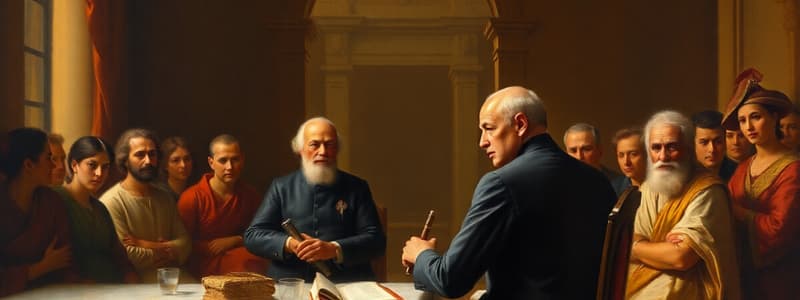Podcast
Questions and Answers
Which of the following statements about the pardoning power of the president is true?
Which of the following statements about the pardoning power of the president is true?
- The president can only grant a pardon in cases of federal offenses.
- The governor's pardoning power is identical to that of the president.
- The president cannot commute a death sentence.
- The president's pardoning power includes the ability to alter the original court's verdict. (correct)
Under what conditions can the president grant a pardon?
Under what conditions can the president grant a pardon?
- When the convict shows remorse for their actions.
- For offenses against Union Law or by military court sentences. (correct)
- When there is significant public pressure to do so.
- For any offense that has been tried in a state court.
What is the primary reason a president's ordinance can be questioned in court?
What is the primary reason a president's ordinance can be questioned in court?
- The ordinance addressed a non-controversial subject.
- The ordinance was not approved by the Council of Ministers.
- The ordinance was issued during a parliamentary session.
- The president prorogued Parliament to avoid discussion on the ordinance. (correct)
How long can an ordinance potentially remain in effect without parliamentary approval?
How long can an ordinance potentially remain in effect without parliamentary approval?
Which of the following is true regarding the ordinance-making power of the president?
Which of the following is true regarding the ordinance-making power of the president?
What type of subject matter can ordinances address?
What type of subject matter can ordinances address?
Which of the following types of pardoning does NOT involve changing the nature of the sentence?
Which of the following types of pardoning does NOT involve changing the nature of the sentence?
Which statement correctly differentiates the pardoning powers of the president and the governor?
Which statement correctly differentiates the pardoning powers of the president and the governor?
What is the primary purpose of the president's pardoning power?
What is the primary purpose of the president's pardoning power?
Under what condition can the president promulgate an ordinance?
Under what condition can the president promulgate an ordinance?
In what condition can the president withdraw an ordinance?
In what condition can the president withdraw an ordinance?
What happens to an ordinance if it is not approved by Parliament within six weeks of reassembly?
What happens to an ordinance if it is not approved by Parliament within six weeks of reassembly?
What is an example of commutation in the context of presidential pardoning power?
What is an example of commutation in the context of presidential pardoning power?
Which statement accurately describes the validity of actions taken under an ordinance that lapses?
Which statement accurately describes the validity of actions taken under an ordinance that lapses?
Which type of pardon involves the complete absolution of both conviction and punishment?
Which type of pardon involves the complete absolution of both conviction and punishment?
Can an ordinance incorporate retrospective provisions?
Can an ordinance incorporate retrospective provisions?
What is the maximum lifespan of an ordinance before it requires parliamentary approval?
What is the maximum lifespan of an ordinance before it requires parliamentary approval?
What is the function of a reprieve in the context of the president's pardoning power?
What is the function of a reprieve in the context of the president's pardoning power?
What limitation exists regarding the validity of an ordinance during parliamentary sessions?
What limitation exists regarding the validity of an ordinance during parliamentary sessions?
What does the Supreme Court state regarding the president's satisfaction in issuing ordinances?
What does the Supreme Court state regarding the president's satisfaction in issuing ordinances?
Which of the following is NOT a condition for the promulgation of an ordinance?
Which of the following is NOT a condition for the promulgation of an ordinance?
What happens if an ordinance is issued while both Houses of Parliament are in session?
What happens if an ordinance is issued while both Houses of Parliament are in session?
How does the ordinance-making power of the president relate to the power of legislation by Parliament?
How does the ordinance-making power of the president relate to the power of legislation by Parliament?
What is the primary purpose of the ordinance-making power of the president?
What is the primary purpose of the ordinance-making power of the president?
Flashcards are hidden until you start studying
Study Notes
Presidential Ordinance Power
- The President can make ordinances when both houses of Parliament are not in session.
- The President can issue ordinances on any subject Parliament can make laws, but within constitutional limitations.
- Ordinances must be presented to Parliament when it resumes session, and are valid for a maximum of 6 weeks.
- Parliament can approve, disapprove, or let the ordinance lapse.
- Ordinances can be withdrawn by the President on the advice of the Council of Ministers.
Governor's Powers Regarding Bills
-
After a bill is passed by a state legislature, the Governor has four options:
- Give assent
- Withhold assent
- Return the bill for reconsideration
- Reserve the bill for the President's consideration
-
If the Governor reserves a bill, the President has three options:
- Give assent
- Withhold assent
- Return the bill for reconsideration
President's Pardoning Power
- The President can pardon, commute, remit, respite, or reprieve sentences.
- The President's pardoning power applies to offenses against Union laws, court-martial sentences, and death sentences.
- The President does not act as a court of appeal but can correct judicial errors or provide relief from harsh sentences.
Governor's Pardoning Power
- The Governor can pardon, commute, remit, respite, or reprieve sentences for offenses against state laws.
- The Governor cannot pardon court-martial sentences or death sentences.
Studying That Suits You
Use AI to generate personalized quizzes and flashcards to suit your learning preferences.




